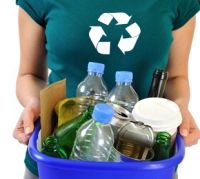

For one week in May 2022, Greenpeace UK organised "The Big Plastic Count" to see how much plastic is being used in each household and categorise each type of plastic that was being disposed of.
An astonishing number of nearly 250,000 people across the UK took part in this survey and counted over 6.4 million pieces of plastic packaging waste in just seven days. It was found that, on average, each household throws away 66 pieces of plastic packaging, which amounts to an estimated 3,432 pieces a year.
If the counted numbers of plastic were typical for each household, it would show that UK households are throwing away an estimated 1.85 billion pieces of plastic a week, or 96.7 billion pieces a year.
The survey found that the most commonly disposed of pieces of plastic that were counted were fruit and vegetable packaging, closely followed by snack bags, packets and wrappers. Each of those items that were disposed of throughout the week exceeded one million.
The report warned that only 12% of this plastic packaging waste is recycled at facilities in the UK and 17% is being shipped overseas for reprocessing rather than being recycled at home. According to Greenpeace, about 62% of the disposed of plastic recorded in the count will not be properly collected for recycling, and likely will end up being disposed of in landfills or incinerated.
The organisers of this campaign say that this exercise proves that recycling is not a solution for reducing the amount of plastic we use every day.
The Greenpeace UK plastic campaigner, Chris Thorne, said: "This is a jaw-dropping amount of plastic waste, ...
"Pretending we can sort this with recycling is just industry green-wash. We're creating a hundred billion bits of waste plastic a year, and recycling is hardly making a dent."
The spokesperson for the Department for Environment, Food and Rural Affairs (DEFRA) said: "We are going further to tackle single use plastics through our landmark Environment Act."
They also highlighted the measures that the UK government already put in place, including banning the supply of plastic straws and cotton buds, as well as finalising proposals for the development of the deposit-return scheme.
Cedrec's take
The best way to manage any waste is to eliminate as much of it as possible at the source. As long as we continue to have an unobstructed provision of cheap plastic packaging for all items that we buy, from fruit and vegetables to meat, toiletries, clothes and electronics, it is unlikely we will be able to combat this issue.
Hopefully, the new provisions of the Environment Act 2021 will give more control in the form of producer responsibility obligations as well as shifting the cost of the disposal onto the producer to reduce plastic at source.